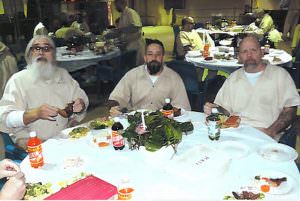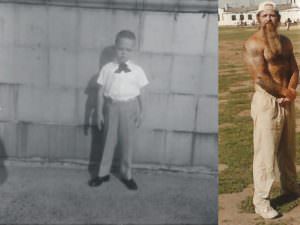Part 5: Back to School and a Sense of Renewal
After earning an associate degree in prison, the author, 58, hopes to complete his Bachelor of Arts study through a program at Rutgers University. Ronald Pierce in 2016, after a class project presentation for the Mountainview Community program at Rutgers University. (Ronald W. Pierce)
Ronald Pierce in 2016, after a class project presentation for the Mountainview Community program at Rutgers University. (Ronald W. Pierce)
By Ronald W. PierceEditor’s note: This is the fifth story in a seven-part series exclusive to Truthdig called “Going Home.” Read Part 1, Part 2, Part 3 and Part 4, Part 6 and Part 7.
I’m anxious to leave the Bo Robinson halfway house in Trenton, N.J., for the Logan Hall halfway house in Newark. I’ve been here for 93 days. I don’t know what I was supposed to learn at this facility. I quietly pack my belongings. I have $23, one nickel, three dimes and 17 pennies. All of my possessions fit into two bags.
I am experiencing the familiar paranoia of prison. It is 12:30 in the afternoon. I’m convinced they have changed their mind about letting me leave Bo Robinson. What if parole made a mistake? Are they waiting for the Department of Corrections to bring me back to prison?
My thoughts are irrational. I’m still trying to digest the fact that I’m on parole, although I have been on that status for three months. Living in a facility run like a jail does little to free you of the mentality that comes with incarceration.
Finally, the call comes in for me to head out.
I am outside. I walk without shackles. It feels strange. I am unsure of each step. I can carry my own bags. There are no cuffs, and my hands are not chained to my waist. I have a strange urge to return to the facility before I get into trouble for leaving without proper restraints.
I have to constantly remind myself that I am on parole. Parole Officer Leake, a short, balding man, walks in front of me. He knows his job is to walk with me. But he is allowing me this experience of walking independently.
Perhaps, I think, he hopes I’ll run so he can shoot me.
The sun is bright. The trees are filled with every shade of green. I feel like Rip Van Winkle. I put my bags into the trunk. I walk to the side of the car. I stand there for a few moments.
“Get in,” Leake says. “I want to get on the road.”
I open the car door. This is the first time I have opened a car door in more than 30 years. I get in. I will remember this feeling for the rest of my life.
Logan Hall is much the same as Bo Robinson. It is, however, more connected to the outside world. It houses federal prisoners, state parolees and county detainees.
The facility administrators insist I attend programs each day. My morning program is orientation. I cannot receive work release until I complete orientation, even though I completed the same program at the Bo Robinson facility.
Ms. Salaam and Ms. Taylor escort me and several others during my first excursion out. We go to the Social Security office to obtain a Social Security card replacement. I sit next to an elderly gentleman.
“Hi,” he says. I nod hello.
“What have you been up to?” he asks.
“I’ve been gone awhile and need to get a new Social Security card,” I answer.
He looks at me as if I were insane. He has something sticking in his ear and a cellphone in his hand. I excuse myself and move two seats over.
I feel baffled. How am I going to adjust to this electronic world?
Several weeks pass, and it doesn’t feel like I’m free, although I feel the easing of restraints. I am taken to Rutgers University to register for classes in the Mountainview Program for ex-offenders. Ali is my driver.
He stops the van. A woman I assume is his wife, dressed in Islamic garments, brings him change and a snack bag filled with grapes and strawberries.
Ali takes some fruit. He hands the bag to me. These are the largest grapes and strawberries I have ever seen. I do not remember the last time I ate grapes. My mouth waters. I realize how much I have missed different kinds of fruits.
There are apples and oranges in prison. There is occasionally a banana at breakfast. Grapes are banned because of their connection to wine. Strawberries are too expensive. I bite into the strawberry. The juice drips onto my goatee. My taste buds explode.
At the university, I enter the Mountainview Community Suite, where I meet Regina, a brown-haired woman, with a warm demeanor, as well a welcoming smile and voice. In her presence, you feel acceptance. She is my academic counselor for the Mountainview Program. There are six others studying on computers in the room. They greet me. I feel overwhelmed. I’m not comfortable around many people.
I soon learn that almost everyone in the room was formerly incarcerated. Regina was incarcerated for four years in the women’s prison in Clinton, N.J. I find this comforting. I don’t have to explain anything to them.
“I am a computer illiterate,” I tell Regina.
“Don’t worry,” she says. “We’ll work with you. You’ll be fine.”
The day before school begins, there is a shooting outside the halfway house. Ali, the driver who shared his strawberries with me, is hit in the arm by a stray bullet. He is not seriously injured.
It is my first day of school. I earned my associate degree in prison. I was in the Bachelor of Arts program. I hope to finish my bachelor’s through the Mountainview Program. I see the other students with tablets and laptops. I have a notebook and two pens. I feel like a dinosaur.
I am 58, older than many of my teachers.
I get on a crowded bus every morning to get to the Newark campus at Rutgers. I stumble backward when the bus starts. I step on people’s feet. I weigh 235 pounds.
An elderly woman berates me for my clumsiness.
I apologize profusely.
“Sorry don’t heal my broken toes,” another passenger says.
I feel guilty. How can I tell them I have not been on a bus since I was 16?
I am silent. I let them vent.
The textbooks cost $150 to $200. I do not have this much money. I am ready to quit school until Regina explains that the books and other expenses are covered by grants.
I like to sit on a bench on campus. I like to look at the trees, grass and the squirrels. I feel a sense of renewal. I wish each passerby a good morning and nice day.
After my first class, I converse with a classmate for the first time. She is a small young lady. She strikes up a conversation as we are walking down a red brick path. I turn abruptly and enter a building while she is in the middle of her sentence.
“Oh, you’re going there,” she says, sounding surprised.
“Yeah,” I say and walk away.
It dawns on me later that I was rude. I am upset with myself. I did not intend to be rude. I share this experience with some classmates. They tell me it is rude. They suggest I apologize. My social skills were destroyed in prison.
I wait for my professor to sign my Halfway Back paper at the end of terrorism class (a study of terrorism and counterterrorism approaches). This paper and site visits are how program administrators keep track of your whereabouts when you are out of the “house.”
The girl I was rude to walks by. I apologize to her. She insists I wasn’t rude. I ask her to accept my apology. She accepts. I thank her. She waits for further conversation. I turn away to get my paper signed.
“Well, bye,” she says a moment later.
I think it’s best if I don’t talk to anyone.
As the weeks of school progress, I am learning to use a computer. I’m afraid of hitting the wrong key.
One day, while I am at the library trying to print articles for my research on mass incarceration, the computer malfunctions.
“It was hacked by Mexicans,” the tech exclaims to his partner. Phyllis, the librarian, laughs.
I worry I am the one who let a hacker into the computer system. Prison does not prepare anyone for the 21st century.
I need counseling services. I need tutoring. I need guidance on time management. I can’t adjust. I feel like I am always in a hurry.
I try to balance my fall coursework with finding a job. I need to get my state ID, Social Security replacement card and other documents. I don’t know how to navigate.
I have constant stress. I am always waiting for the hammer to fall. I always feel like I’m on the verge of doing something that will mean losing my freedom.
Part 6 of the “Going Home” series will be published on Truthdig on Monday.
Ronald W. Pierce served 30 years, eight months and 14 days in New Jersey prisons for murder. Released in 2016, Pierce now is living in Jackson, N.J., and completing his Bachelor of Arts study at Rutgers University. He is an honors student, majoring in justice studies with a minor in sociology.
Your support matters…Independent journalism is under threat and overshadowed by heavily funded mainstream media.
You can help level the playing field. Become a member.
Your tax-deductible contribution keeps us digging beneath the headlines to give you thought-provoking, investigative reporting and analysis that unearths what's really happening- without compromise.
Give today to support our courageous, independent journalists.





You need to be a supporter to comment.
There are currently no responses to this article.
Be the first to respond.